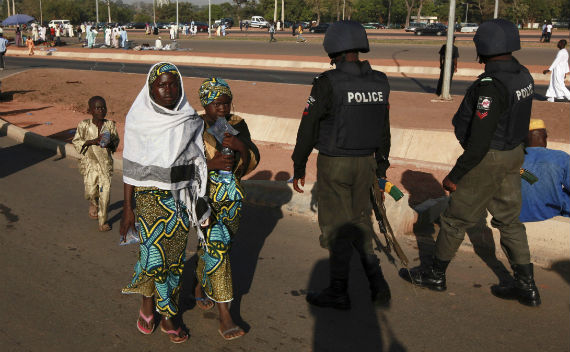Boko Haram Attacks Escalate in Northern Nigeria
More on:

An alleged spokesman for northern Islamic terrorist movement Boko Haram, speaking to Agence France-Presse, took responsibility for bloody attacks on Friday in Damaturu in Yobe state and Maiduguri in Borno state as well as in two smaller towns. The attacks appear coordinated and involved car bombs, at least one a suicide attack, and young men using machine guns and improvised explosives.
Reported numbers killed currently range from sixty-five to one hundred and fifty, mostly in Damaturu. (Casualties in Nigeria are often understated.) The attacks targeted police stations and other government facilities, as is the usual pattern involving Boko Haram. This time, however, there were also attacks on the Christian quarter in Damaturu. Subsequently, over the weekend, the U.S. Embassy in Abuja issued a public warning of possible Boko Haram attacks on the city’s three largest hotels, where U.S. citizens normally stay. A Boko Haram attack on facilities identified with Americans would be new and could indicate that it has concluded that the United States is allied with the Abuja government.
AFP quotes the alleged Boko Haram spokesman as saying "We will continue attacking federal government formations until security forces stop persecuting our members and vulnerable civilians."
Since the inauguration of the southern Christian Goodluck Jonathan as president in May, Boko Haram attacks in the northeast have occurred almost daily. The group has also claimed responsibility for bombings of the national police headquarters and the UN headquarters building in Abuja. Security fears led Jonathan, in effect, to cancel the public celebration of Nigeria’s fifty-first anniversary of its independence in October.
The Jonathan administration is dealing with Boko Haram as solely a security issue, rather than as a reflection of the North’s impoverishment and alienation from the rest of the country. The Abuja government has responded by heavy deployment of military and police in the North. However, these security forces have been heavy handed and stand accused of serious human rights abuses against civilians. Some northern political leaders have urged that the number and deployment of security personnel be reduced. The police are notoriously corrupt and known for the shake-down of those transiting checkpoints, which are now legion. For many Nigerians, the police is the face of the Abuja government.
Friday’s attacks are likely to have a particular resonance in Nigeria because they occurred two days before Eid, a major Islamic holiday.
Last week, the head of a major Yoruba organization in southwest Nigeria--it includes Lagos and Ibadan and is far from where most of the mayhem is taking place--said that the country may break up because the government can no longer guarantee security. The Friday attacks--their extent and their apparent coordination--is likely to underscore for many Nigerians the growing insecurity in the country. Already one of the opposition political parties is calling on the Jonathan government to sack wholesale the leadership of the security services.
More on:
 Online Store
Online Store